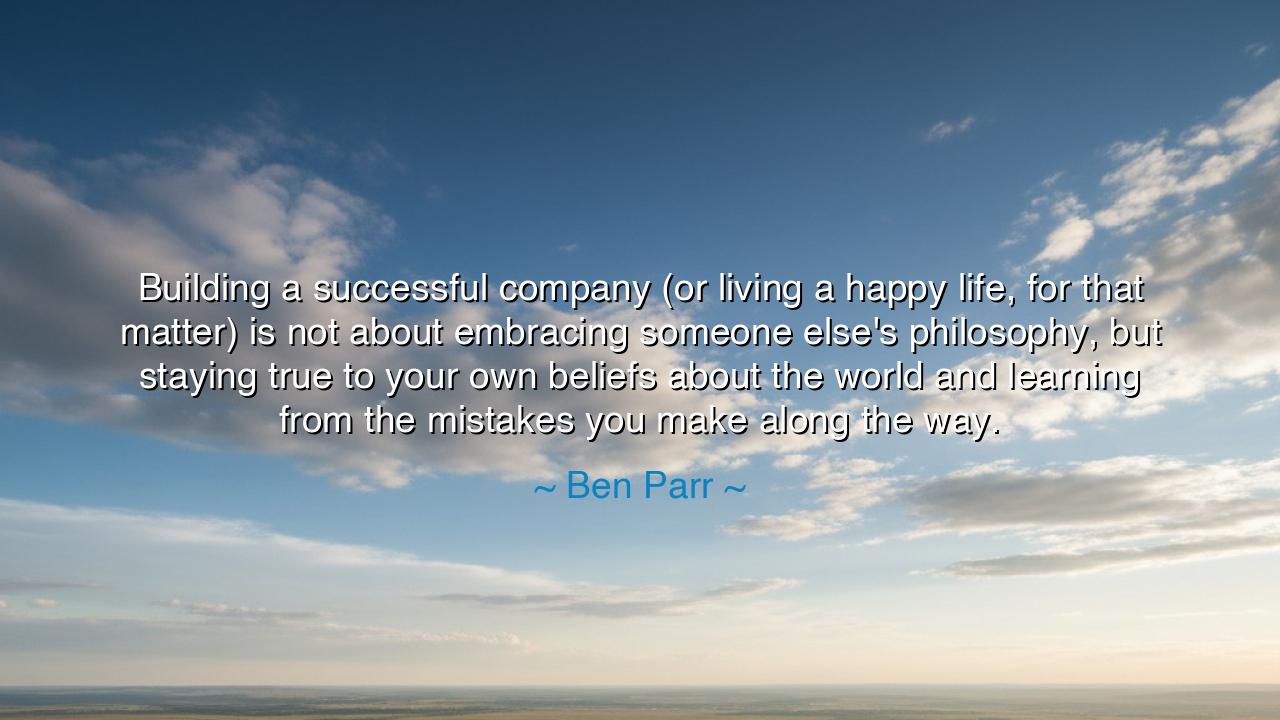
Building a successful company (or living a happy life, for that
Building a successful company (or living a happy life, for that matter) is not about embracing someone else's philosophy, but staying true to your own beliefs about the world and learning from the mistakes you make along the way.






“Building a successful company (or living a happy life, for that matter) is not about embracing someone else’s philosophy, but staying true to your own beliefs about the world and learning from the mistakes you make along the way.” — Ben Parr
In this wise and steady reflection, Ben Parr speaks not merely to those who build companies, but to all who strive to build lives of purpose. His words are both a call to authenticity and a hymn to the courage of imperfection. He reminds us that the true architect of success is not imitation, but integrity — the quiet and persistent commitment to one’s own vision. To follow another’s path is to walk in their shadow; to follow your own, however uncertain, is to walk in light. The road of life and creation, he teaches, does not demand that we be flawless, only that we be faithful — faithful to the beliefs that define our spirit, and willing to learn from the mistakes that refine it.
In the age of noise and advice, it is easy to lose oneself in the philosophies of others. The world is filled with voices proclaiming, “This is the way to live; this is the secret of success.” Yet Parr reminds us that no borrowed wisdom can substitute for the hard-earned truth discovered through one’s own experience. The ancients too spoke of this. Socrates urged, “Know thyself,” for all external teachings are meaningless without inner understanding. Confucius taught that the superior man follows the path of his own virtue, not the fashions of the crowd. So too does Parr echo these timeless voices: that to live rightly or to build greatly, one must first stay true to the compass within.
Consider the story of Steve Jobs, who, much like the heroes of old, defied convention to remain true to his own beliefs. When he founded Apple, he was surrounded by experts who told him how things “should” be done — that technology should be practical, that design was secondary, that simplicity would never sell. But Jobs refused to bow to the philosophies of others. He believed in beauty, in intuition, in the marriage of art and engineering. He was not without error — he stumbled, he was even cast out of his own company — yet through those mistakes, he learned, adapted, and returned stronger. His legacy stands as living proof that greatness does not arise from mimicry, but from the relentless pursuit of one’s inner truth.
Parr’s wisdom also speaks to the universal struggle between fear and authenticity. Many fear to trust themselves; they seek the security of other people’s blueprints. Yet every great builder — of empires, of art, of joy — has known that uncertainty is the price of originality. To build a successful company, or indeed to live a happy life, one must embrace the unknown, guided not by borrowed doctrine but by one’s own evolving understanding. Mistakes, in this view, are not failures; they are the chisels that sculpt character. Each misstep, faced with humility, becomes a teacher; each fall, a foundation for greater wisdom.
To learn from mistakes is to walk the sacred path of growth. The ancients likened it to the forging of a blade: only through fire and repeated hammering does steel gain its strength. So it is with the human spirit. The one who hides from error remains untested, unsharpened, and ultimately unfulfilled. Parr’s insight is a reminder that wisdom is not inherited — it is earned through the experience of trial and correction. Those who build their lives upon their own understanding, refining it with each lesson of the heart, become masters not only of their craft but of themselves.
There is also in his words a deep moral teaching — that one’s beliefs about the world shape both enterprise and existence. If a person believes the world is hostile, they will build in fear; if they believe it is full of possibility, they will build with hope. Thus, the philosopher and the entrepreneur share the same task: to look inward, discern what they truly believe, and let those beliefs guide their actions. This, and not the imitation of others, is the secret to both prosperity and peace.
So, dear reader, take this teaching to heart. In your work, in your relationships, in your journey through life — resist the temptation to live by borrowed light. Stay true to your own beliefs, even when the world doubts them. Seek mentors, yes, but not masters. Let your mistakes be your tutors, your struggles your curriculum. Each day, learn anew, adjust, and grow stronger in the truth of your own experience. For the one who listens to their own conscience, who learns from the blows of life and continues forward in faith, becomes both builder and philosopher — a creator of not just success, but meaning. And in that creation lies the highest art of all: the art of living well, honestly, and completely.






AAdministratorAdministrator
Welcome, honored guests. Please leave a comment, we will respond soon